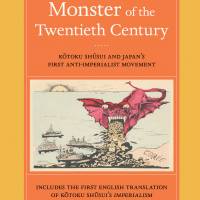Educated in both the Confucian classics and European liberalism by political theorist and statesman Nakae Chomin (1847-1901), Kotoku Shusui (1871-1911) came to be one of Japan's fiercest advocates of radical progressivism.
In 1903, Shusui founded the Heimin Shinbun newspaper with Sakai Toshihiko (1871-1933); the following year they published their translation of the Communist Manifesto.
While imprisoned for press law violations in 1905, Shusui discovered the works of the anarchist philosopher Peter Kropotkin. This in turn inspired his own turn towards anarchism which he maintained until his execution in 1911 for alleged involvement in the "high treason incident" (a socialist-anarchist plot to assassinate the Emperor Meiji).
"Imperialism" was one of Shusui's earlier works, published in 1901 before the real drama described above began.
Robert Thomas Tierney's book on Shusui is divided into two halves. The first is an intellectual biography of Shusui and capsule history of his times, wide-ranging and carefully sourced. This is followed by a translation of "Imperialism" itself — the first ever into English.
Personally, this reviewer would have preferred more commitment to recreating Shusui's intricate, classically styled rhetoric, but Tierney's more straightforward approach has its virtues, too, bringing the contemporary reader face to face with the ongoing relevance of the work rather than allowing its dismissal as a quaint period piece.


















With your current subscription plan you can comment on stories. However, before writing your first comment, please create a display name in the Profile section of your subscriber account page.